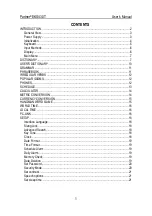
STAR
TRAC
S
SERIES
TREADMILLS
O
WNER
’
S
M
ANUAL
37
T
RAINING
I
NFORMATION
To assist you in your training program, this chapter provides you with exercise principles, tips for training and hints to stay
motivated climbing up the conditioning ladder.
THE FIRST STEP TO A BETTER LIFESTYLE
With the
STAR TRAC S SERIES TREADMILL
, you’ve taken an important first step to achieving your fitness goal. But,
it’s important to have the right fitness tools to stay motivated and achieve results. About half of all people who start an
exercise program quit within 6-12 months. What is the key to success for the other half? Motivation!
As you may know, exercise reduces the factors associated with the development of heart disease, hypertension, diabetes,
obesity and back disorders. Researchers have concluded that a healthful life-style including regular exercise can extend your
life expectancy by as much as fifteen years! More importantly, exercise will help make all your years - no matter how may
there are - productive and enjoyable.
What constitutes a regular exercise regimen? If you stick with a consistent workout program for 30 minutes, three times a week,
for 3 months, you will be on your way to a long-term fitness program. Part of the motivation for a regular exercise regimen will
stem from the results you will both see and feel after three months. In fact, many exercisers start to experience results in as early
as one week!
GETTING STARTED - WALKERS AND RUNNERS
For fitness newcomers or veterans, the
STAR TRAC S SERIES TREADMILL
offers tailor-made walking and running
programs. The following information will be useful when developing your own exercise program.
Assessing Fitness Level
Conducting a cardiovascular endurance assessment is a great way to start an exercise regimen. The results obtained from
the F
ITNESS
T
EST
on your
STAR TRAC S SERIES TREADMILL
provide great baseline information to help determine your
proper workout intensity levels, and it serves as a great motivational tool for showing improvements over time. Below is a
simple test to follow. This assessment should only be used with apparently healthy adults.
The F
ITNESS
T
EST
is a modified version of the Balke and Ware protocol for maximal VO2 treadmill testing. The F
ITNESS
T
EST
requires 12 minutes to complete. During the F
ITNESS
T
EST
, treadmill speed remains at a constant 3.4 mph. Treadmill incline is
set at 0% during the first minute, increases to 2% during the second minute, and increases by 1%-per-minute for the remainder of
the test. Your heart rate results are compared with charted data for your corresponding age and gender. Test results include your
calculated VO2 max. VO2 max is a physiological measurement of a body’s ability to absorb oxygen, and has specific correlation to
your fitness level.
The Warm Up
Warming-up prepares you for physical activity by increasing body temperature, allowing the muscles to relax and contract
more smoothly and efficiently, and lubricating the joints. Good warm-up exercises include walking, bicycling, jogging and
light calisthenics. Proper warm-up may also help prevent injuries and reduce the likelihood of cardiac abnormalities. A mild
sweat is a good indication that the body is sufficiently warmed-up.
Pre-Exercise Stretching
A flexibility program prior to walking or running is designed to help improve performance and reduce the risk of injury
during the activity. When you are stretching, remember these simple rules:
•
An active warm-up is recommended prior to vigorous stretching exercises. If stretches are performed, they should be
done with caution, so as to not over stretch muscles.
•
Do not force a stretch. The degree of stretching should not cause significant pain.
•
Hold the stretch for 10 to 15 seconds without bouncing.
•
Repeat each stretch two or three times for increased flexibility.
•
Try to maintain good posture and remember to breathe during the stretch.
The following muscle groups should be stretched/warmed up for any walking or running program.
•
Quadriceps
•
Hamstrings
•
Calves
•
Glutes
•
Inner thighs
•
Back Muscles
















































